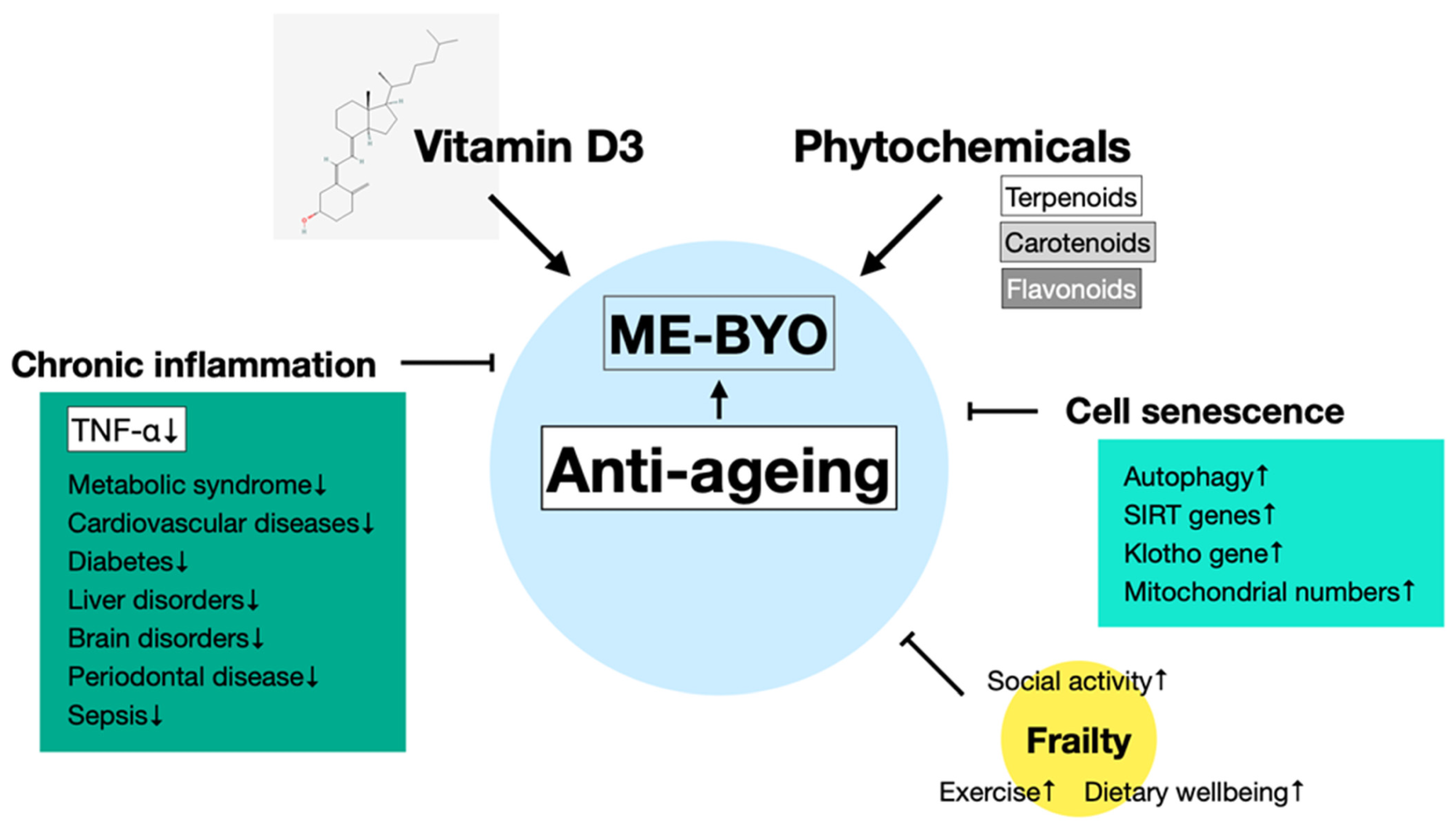Vitamin D3, a fat-soluble nutrient obtained from both sunlight exposure and dietary sources, is crucial for bone health and immune system regulation. Deficiency in 25-OH-D3 is linked to increased severity of respiratory infections. Phytochemicals such as terpenoids, polyphenols, carotenoids, and flavonoids are abundant in various plant-based foods and contribute to human health. As interest grows in healthy aging and disease prevention, understanding the synergistic effects of these nutrients becomes increasingly important for promoting longevity and vitality. In the present study, researchers review the current evidence on the essential role of vitamin D3 and phytochemicals in promoting health and combating aging.
Vitamin D3
Vitamin D3 inhibits tumor necrosis factor-α (TNF-α) production via vitamin D receptor (VDR) binding. Vitamin D3 blood levels of 30 ng/mL or higher are considered sufficient. Geographic location, skin pigmentation, and seasonal variations influence vitamin D3 synthesis, with rickets now primarily prevalent in low-income countries.
Low serum 25-OH-D3 levels are linked to increased susceptibility to seasonal flu and coronavirus disease 2019 (COVID-19), as well as increased mortality. Maintaining serum 25-OH-D3 levels above 30 ng/mL may mitigate severe COVID-19 symptoms, although excessive intake can cause toxicity, normalizing upon cessation.
Fibroblast growth factor (FGF23) regulates phosphorus and vitamin D3 metabolism, with its deficiency leading to hyperphosphatemia and excess causing hypophosphatemia. Activated vitamin D3 activates the innate immune system, suppressing inflammation by downregulating proinflammatory cytokines and promoting antimicrobial peptide production in neutrophils and macrophages while also exerting antiviral activity.
Deficiency of vitamin D3 is linked to chronic diseases like non-alcoholic fatty liver disease (NAFLD), metabolic syndrome, and osteoporosis. In aging, it exacerbates inflammation and contributes to age-related conditions. Additionally, vitamin D3 is associated with beneficial gut bacteria and aids in immune function. Gut microbiota changes across generations, impacting health in aging.
Phytochemicals
The health-promoting effects of phytochemicals found in fruits and vegetables are known. Evidence suggests these compounds offer antioxidant and anti-inflammatory benefits, with grapes being particularly rich in them.
Terpenoids like oleanolic acid and ursolic acid play vital roles in bone metabolism and skeletal muscle health, respectively, alongside influencing vitamin D3 metabolism. Carotenoids like β-carotene and lutein in grapes support vision maintenance as they are vitamin A precursors. Grapes contain flavonoids like catechins and quercetin, with oligomeric procyanidins being the predominant procyanidins. Phytochemicals like curcumin and quercetin demonstrate direct binding to VDR, offering potential benefits in preventing age-related conditions and chronic diseases.
However, the bioavailability of phytochemicals is known to be low. Nanotechnology aids in enhancing the bioavailability of phytochemicals, particularly in cancer therapy, by facilitating targeted delivery to specific organs or cells. Additionally, chemical modifications, such as glycosylation, improve the water solubility of compounds like hesperidin and quercetin, enhancing their absorption and efficacy, particularly in atherosclerosis.
Synergy between vitamin D3 and phytochemicals
Regular intake of phytochemicals and maintaining high blood 25-OH-D3 levels can upregulate natural immune responses, potentially mitigating severe COVID-19 symptoms. Phytochemicals, particularly flavonoids, inhibit NF-κB activation and TNF-α production, synergizing with vitamin D3 to prevent chronic inflammation and slow down aging.
Oleanolic acid enhances bone health by regulating vitamin D metabolism and suppressing inflammation. Additionally, phytoestrogens and compounds like β-cryptoxanthin contribute to preventing osteoporosis, while studies explore the benefits of combined interventions with vitamin D and tea catechins.
Mitochondrial decline with age leads to increased reactive oxygen species production. Calorie restriction activates longevity-related genes like sirtuins, enhancing cell rejuvenation and protecting against age-related diseases while synergizing with vitamin D3 and phytochemicals for anti-aging benefits.
Chronic inflammation contributes to various diseases like obesity, cardiovascular issues, Alzheimer's, and periodontal disease. Advanced glycation end-products accelerate aging, but flavonoids mitigate their effects. Periodontal disease exacerbates inflammation and is linked to Alzheimer's. Managing chronic inflammation is crucial for healthy aging, with vitamin D3 and flavonoids offering anti-inflammatory benefits.
The Mediterranean diet, focusing on low-glycemic-index whole grains, vegetables, fruits, olive oil, fish, and wine, reduces the risk of various diseases. In Japan, the traditional diet promotes longevity, focusing on fish, seafood, and phytochemical-rich foods, with calorie restriction contributing to healthy aging. Supplementation with vitamin D3, phytochemicals, and omega-3 fatty acids, particularly docosahexaenoic acid (DHA), helps combat chronic inflammation and supports brain health. The ancient concept of "ME-BYO," a non-disease condition, underscores the importance of preventive measures for maintaining health and longevity.
 Schematic representation of anti-aging effects of vitamin D3 and phytochemicals. Vitamin D3 and phytochemicals suppress not only frailty, a bone-related illness associated with aging but also senescence of cells and chronic inflammation and reduce the risk of related diseases. These effects manifest anti-aging effects through the prevention of “ME-BYO” (a non-disease condition) and participation in healthy longevity.
Schematic representation of anti-aging effects of vitamin D3 and phytochemicals. Vitamin D3 and phytochemicals suppress not only frailty, a bone-related illness associated with aging but also senescence of cells and chronic inflammation and reduce the risk of related diseases. These effects manifest anti-aging effects through the prevention of “ME-BYO” (a non-disease condition) and participation in healthy longevity.
Conclusion
In conclusion, the review suggests that the simultaneous intake of vitamin D3 and phytochemicals may prevent aging and support a non-disease condition by potentially suppressing chronic inflammation, improving immunity, and maintaining a healthy gut flora.
Journal reference:
- The Potential Use of Vitamin D3 and Phytochemicals for Their Anti-Ageing Effects. Santa K. et al., International Journal of Molecular Sciences, 25(4):2125 (2024), DOI: 10.3390/ijms25042125, https://www.mdpi.com/1422-0067/25/4/2125